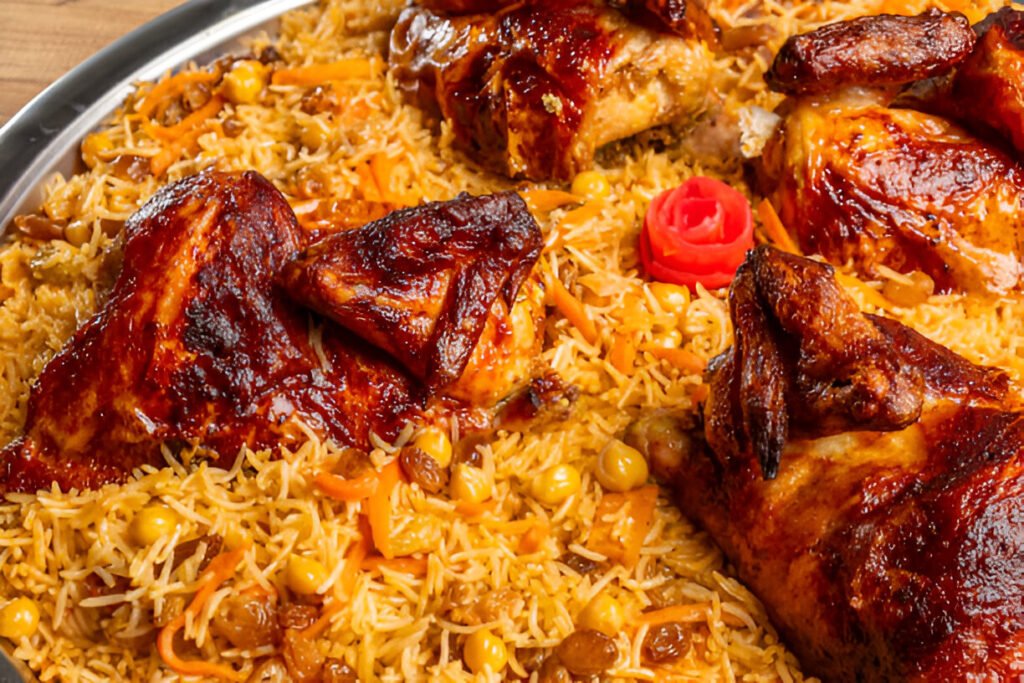The religious center of Islam, Makkah, welcomes millions of pilgrims each year. In addition to its religious significance, the city has a diverse food scene that combines international influences with local Saudi flavors. Discovering Makkah’s indigenous food, which includes both savory and sweet dishes, is an adventure in both culture and history. This article provides insights into Makkah’s rich culinary heritage by highlighting some of the must-try dishes there.
Introduction to Makkah’s Culinary Landscape
The varied history of the city and the steady stream of pilgrims are reflected in Makkah’s culinary culture. The city is a cultural melting pot, and as such, South Asian, Middle Eastern, African, and Arabian influences have influenced its food. Makkah’s traditional foods are rich and satisfying since they are frequently made with aromatic spices, tender meats, and sturdy grains.
Traditional Dishes in Makkah
1. Kabsa: The Iconic Rice Dish
A mainstay of Makkah’s culinary scene, kabsa is a traditional Saudi dish. Any visitor to the city should sample Kabsa, which is made with long-grain basmati rice, a mixture of spices, and soft meat (such as goat, lamb, or chicken). Nuts and raisins are frequently used as garnishes to add taste and texture.
2. Mandi: A Yemeni-Inspired Delight
Another well-liked meal in Makkah that was brought by Yemeni influence is mandi. This meal has a smokey flavor thanks to the slow-cooked or steamed meat that is served with aromatic rice. Mandi is a popular dish for celebrations and is traditionally prepared in subterranean pits.
3. Saleeg: A Creamy Comfort Food
The Hijaz region, which contains Makkah, is the origin of the creamy rice delicacy known as saleeg. It has a rich flavor and a silky texture because it is made with milk, butter, and either lamb or chicken. To counterbalance the creaminess, it’s frequently served with a side of tomato sauce.
4. Jareesh: Saudi Wheat Porridge
A traditional dish called jareesh is prepared by cooking crushed wheat with yogurt and spices. This hearty dish is frequently savored at family get-togethers. The dish is a local favorite because of its mild tanginess and creamy smoothness.
Street Foods in Makkah
1. Mutabbaq: The Stuffed Pastry
A common street dish in Makkah is mutabbaq, which is made up of thin pastry sheets stuffed with a blend of eggs, veggies, and minced meat before being deep-fried till golden. While visiting the city, this delicious nibble is ideal for a quick snack.
2. Sambousek: A Savory Snack
Like samosas, sambosek are little pockets of pastry filled with cheese, veggies, or spiced meat. They are a typical street meal and a well-liked restaurant appetizer.
3. Ful Medames: The Hearty Breakfast
Fava beans, olive oil, garlic, and spices are the ingredients of the popular morning dish Ful Medames. It’s a healthy and satisfying way to start the day and is frequently served with fresh bread.
Sweet Delights in Makkah
1. Ma’amoul: Date-Filled Cookies
Traditional shortbread cookies called ma’amoul are stuffed with figs, dates, or nuts. Arabic coffee is typically paired with these delicious delicacies, particularly during holidays like Eid.
2. Luqaimat: Sweet Dumplings
Luqaimat are balls of deep-fried dough that have been dipped in honey or sweet syrup. Crunchy on the outside and soft on the inside, they’re a popular dessert during Ramadan.
3. Basbousa: A Semolina Cake
Basbousa is a sweet cake made from semolina, soaked in sugar syrup, and often topped with almonds or coconut. Its moist texture and delicate sweetness make it a favorite among locals and visitors alike.
Beverages to Complement Your Culinary Journey
1. Arabic Coffee (Qahwa)
Arabic coffee, or Qahwa, is a hallmark of Saudi hospitality. Brewed with cardamom and served in small cups, it’s often accompanied by dates.
2. Jallab: A Refreshing Drink
A popular beverage, jallab is made with sugar, rose water, and grape molasses and garnished with raisins and pine nuts. It is delicious and refreshing, making it ideal for Makkah’s warm temperature.
3. Mint Tea
Mint tea is a common beverage in Makkah, offering a soothing and aromatic experience. It is consumed all day long, frequently following meals.
Dining Etiquette in Makkah
- There are several cultural customs to consider when dining in Makkah:
- When eating or passing food, always use your right hand.
- Family-style lunches are not unusual because sharing food is a frequent practice.
- When visiting eateries or food vendors, dress modestly and show consideration for regional traditions.
Makkah’s culinary options reflect the city’s rich and varied past. Every meal in Makkah has a backstory, from rich traditional fare like Kabsa and Saleeg to sweet treats like Ma’amoul and Luqaimat. Discovering the city’s culinary culture is an experience worth relishing, regardless of whether you’re a pilgrim or a tourist. Therefore, don’t pass up the opportunity to savor these regional specialties and feel the warmth of Saudi hospitality the next time you’re in Makkah.



